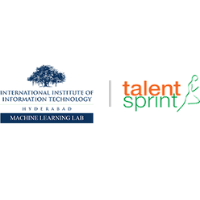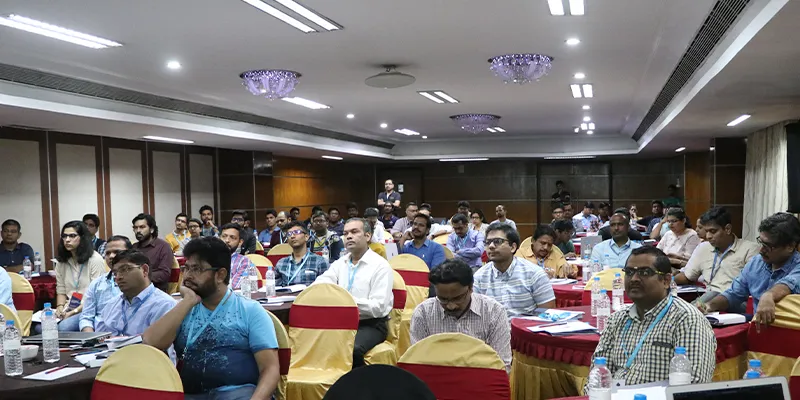
IIIT Hyderabad I TalentSprint
View Brand PublisherThis workshop by IIIT Hyderabad is helping demystify the world of AI and ML
What can Artificial Intelligence (AI) really do in today’s times? Can AI truly replace humans? – these questions and more were addressed at a day-long workshop organised by IIIT Hyderabad’s Machine Learning Lab in Bengaluru recently. The seminar, ‘Demystifying AI and ML’, was powered by TalentSprint, an edtech platform bringing transformational learning programs to young and experienced professionals.
“The idea was to ensure that the right information regarding AI is being disseminated. We also sought to bridge the gap between industry and research,” Anoop Namboodiri, Associate Professor, Centre for Visual Information and Technology, IIIT Hyderabad, told YourStory, ahead of the sessions.
Dr C. V. Jawahar, Dean, Research and Development at IIIT Hyderabad, kicked-off the workshop by giving an overview into the world of AI research, the challenges being addressed, and emerging technologies being developed every day.

The workshop, spread over five sessions, threw light on emerging use cases, how systems understand language, AI in health, wellness and sports, and case studies of deep tech implementations.
Data as a catalyst
The field of Artificial Intelligence research was founded as an academic discipline in 1956 on the assumption that human intelligence "can be so precisely described that a machine can be made to simulate it".
AI research has, since then, included reasoning, knowledge representation, natural language processing, and computational intelligence, among others. The difference between then and now is that these technologies have begun working only now, thanks to the large availability of data.
“Big data, computer cloud, large software libraries have become a new ecosystem to facilitate the growth and application of AI systems. Also, humans are adapting more to these technologies and big money is being invested in it,” Dr Jawahar said.
From insight into data, the discussion moved towards AI and language processing. While areas such as speech recognition and language synthesis have made advancements, making computers understand natural language is the next big goal. “Understanding words, morphology, semantics, and aspects such as generating sentences are all on the cards,” Dr Jawahar said.
Use cases and application of AI and ML
When it comes to practical applications of AI, the possibilities are infinite, in areas like healthcare, 3D construction, biometrics, security, etc., Dr Namboodiri explained, in a session dedicated to use cases of AI and ML. He cited the following examples to give participants an insider’s perspective.
1.Satellite image segmentation
With the help of AI, satellite images can be marked into categories like regions, roads, barren lands, rivers, etc. When the satellite flies over the same area again, it can combine previous and current data to compare. Such applications are extremely useful during natural calamities such as floods, tsunamis and earthquakes, and help plan rescue missions and build new infrastructure.
2.3D reconstruction
Preserving ancient monuments is one of the biggest ways to protect our history. Digital conservation via 3D reconstruction has gained steam. Dr Namboodiri has been involved in the ambitious project to preserve the Hampi ruins via digitally recreating them. 3D reconstruction, he said, is a classic example of computer vision solution.
3. Biometrics
Over the last few years, there has been much dialogue on data protection and privacy issues surrounding biometric data storage systems. However, Dr Namboodiri offers a counter view: Biometrics, like fingerprints and iris pattern matching, prove to be valuable in tracing missing children. “Since the proliferation of Aadhaar, several cases of missing children have been solved, thanks to their stored biometrics,” he said.
4. Automated vision
A potential application for automated vision is automotive safety, wherein road damage, potholes, warning detection (all part of autonomous navigation) can be utilised to minimise road accidents.
Apart from all this, the workshop also highlighted how augmented reality, 3D shape and motion recovery, and entertainment, etc. are among the many crucial areas in which AI and ML applications are being developed.
“The workshop introduced me to a deeper side of AI and Machine Learning concepts, especially the use cases by the moderators caught my attention,” participant Pramod Mohan from Mercedez Benz R&D India said. Echoing Mohan’s sentiment, Shashank, another attendee said, “The workshop gave us a clear understanding of how AI can influence the functionalities of any industry. Meeting experts and obtaining their advice on my idea is the best takeaway from the AIML workshop.”
IIIT Hyderabad – Charting a path towards AI and ML
IIIT Hyderabad hosts the number one rated Machine Learning Lab in India. The institute’s incubator has hosted over 300 startups on campus, of which many have made a mark using AI and ML in diagnostics, education and CRM, among others.
Onward Health, a Bengaluru-based startup, is one among them. It found its footing at IIIT Hyderabad and is now working towards automating medical diagnosis in oncology and histopathology. Docturnal, another startup, is using AI to diagnose tuberculosis from the sound of a cough while Rady8, based out of Hyderabad, is focused on smartphone-based retinal imaging to prevent blindness in low-income countries.
In the field of education too, startups incubated by IIIT Hyderabad such as Scholr are making a splash. Scholr is an AI-based learning assistant for school students. Instoried, an AI-driven deep tech content startup that helps brands predict the emotional impact of their content upon their customers' minds, is also a product of IIIT Hyderabad’s efforts towards AI and ML.
Following this 360-degree view into the world of AI and ML, the workshop’s last leg focused on building a real-world solution in a couple of hours through a spirited hackathon. Participants were asked to analyse Twitter hashtag trends and segregate them into positive and negative sentiments based on available tweets in the public domain.
If you missed your chance to get a deeper understanding of the fascinating world of AI and ML in this workshop, worry not. IIIT Hyderabad is organising yet another workshop on ‘Demystifying AI and ML’, powered by TalentSprint on December 14, 2019, from 8.30 AM to 6 PM at a prominent location on Race Course Road. The day-long workshop will answer all your questions and mysteries surrounding AI – its basics, underlying technologies, current trends, new research in the area and much more from senior faculty of India's leading AI research group. So, if you are a developer, manager, industry leader or researchers excited by the endless possibilities in the world of AI, and want to drive initiatives to build a business of the future, don’t miss the second edition of the ‘Demystifying AI and ML’ seminar. Register Now!







